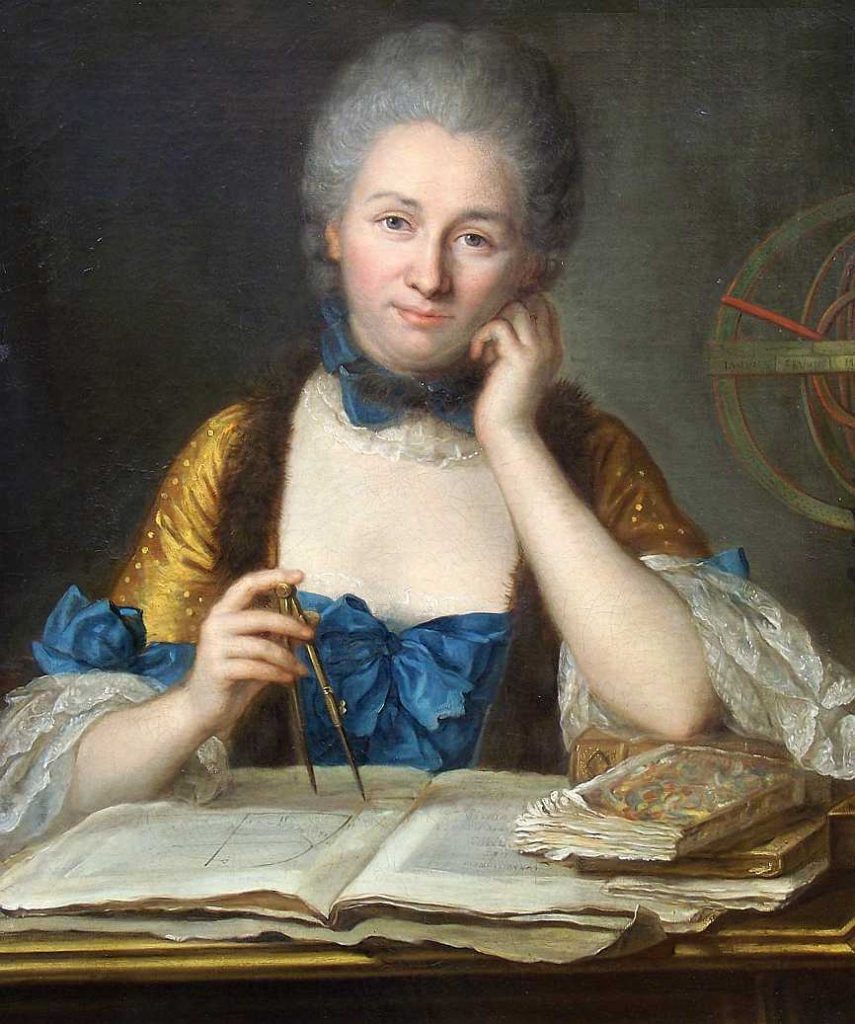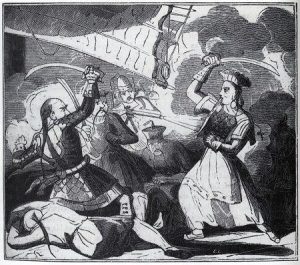In the early Eighteenth Century, intellectual themes were not part of women’s duties, and it was frowned upon for women to research and question. That is why it is so extraordinary that Émilie du Châtelet, a French woman, became a mathematician and scientist. Voltaire told the king of Prussia, Frederick the Great, in a letter that Châtelet was “a great man whose only fault was being a woman.”1
In 1706, when Émilie du Châtelet was born, French society had restraints on women that men did not face, such as not having real access to education. In Early Modern France, “the state would control the fathers, the fathers would control the families.”2 However, the Enlightenment Era did bring about enough change in France so that it was possible for Châtelet to become educated and advance in her career.3 She was lucky in the fact that she had an “unusually enlightened” father who gave Châtelet such a good education. She was educated in Latin, Italian, English, Spanish, Greek, Mathematics, Astronomy, Geography, and Poetry. Her mother also encouraged her and reflected a “cultivated background.”4
Châtelet changed and influenced society through her work on mathematics and scientific works. She published an introduction to Newtonian mechanics in 1740, and she even translated Newton’s Principia into French, with comments explaining the difficult mathematics to a popular audience.5 This was significant because not only could more of the population now read the works of Newton, but because of her commentary, more of the population could now understand it. It also introduced Newton into mainstream French scientific life. She went into detail on Newton’s theory of Gravity and she recast many of Newton’s theories and results in the “more powerful and suggestive notation of…. Calculus.”6 This had a great effect on the other scientists and mathematicians of the time. Châtelet’s work helped others to understand the complicated Newtonian system. By exploring Newton’s theses, and writing them for the educated public to read, Châtelet changed France.

Châtelet was married in June 1725 to Florent-Claude, marquis du Châtelet and count of Lomont. However, after only three years with her, he left to pursue a military career and rarely visited her. This is when Châtelet began an affair with Voltaire, another lover of Math and Science.7 In order to get her works published, Châtelet had to have Voltaire co-author them with her, but only his name appeared on the front cover. Emily Grosholz writes that Voltaire had not mastered the mathematics from the Principia, but instead relied on Châtelet to “write the technical sections of the book” he was writing called Elements of Newton’s Philosophy.8 Châtelet also discussed research on the solar system, electricity, and magnetism. She had just finished her translation of the Principia, when she died of “childbirth fever,” from a scandalous pregnancy with Voltaire.9
In her unusual career, Émilie du Châtelet worked with other famed scholars and succeeded in making mathematics a language that many more people could understand. As a woman, she opened the doors for other women to follow in her footsteps and she changed the world with her concepts and understandings of these men’s topics.
- Jerry Bentley, Herbert Ziegler, and Heather Streets-Salter, Traditions and Encounters: A Brief Global History, 4th ed., vol. 2 (McGraw Hill Education, 2016), 390. ↵
- James B. Collins, “The Economic Role of Women in Seventeenth-Century France,” French Historical Studies 16, no. 2 (Fall 1989): 436. ↵
- Ruth Hagengruber, “Emilie Du Châtelet, 1706–1749: Transformer of Metaphysics and Scientist,” The Mathematical Intelligencer 38, no. 4 (December 1, 2016): 1. ↵
- Ruth Hagengruber, “Emilie Du Châtelet, 1706–1749: Transformer of Metaphysics and Scientist,” The Mathematical Intelligencer 38, no. 4 (December 1, 2016): 2. ↵
- Emily Grosholz, “Candles in the Dark: Emilie Du Chatelet and Mary Somerville,” The Hudson Review, no. 4 (2013): 669. ↵
- Emily Grosholz, “Candles in the Dark: Emilie Du Chatelet and Mary Somerville,” The Hudson Review, no. 4 (2013): 669. ↵
- Complete Dictionary of Scientific Biography, 2008, s.v. “Châtelet, Gabrielle-Émilie Le Tonnelier De Breteuil, Marquise Du.” ↵
- Ruth Hagengruber, “Emilie Du Châtelet, 1706–1749: Transformer of Metaphysics and Scientist,” The Mathematical Intelligencer 38, no. 4 (December 1, 2016): 2-3. ↵
- Emily Grosholz, “Candles in the Dark: Emilie Du Chatelet and Mary Somerville,” The Hudson Review, no. 4 (2013): 669. ↵



81 comments
Matthew Swaykus
Yet another great article about women in the field of math and science. This woman, whose name I could not pronounce properly even if I tried, was brilliant and it is very fortunate that her parents did not discourage her. She learned 5 different languages and the principles of mathematics and science so well, that she could explain it to anyone capable of reading. I, for one, have trouble understanding some of Sir Isaac Newton’s concepts and I am in college!
Diego Terrazas
It is sad to hear that her work and intelligence was not appreciated let alone acknowledged. She made such great contributions to the scientific world, but alas her great mind has been discovered. I did not know she translated Newton’s work, which is impressive, this way newly found scientific theories are known worldwide. The intellectual property that women possessed was greatly underappreciated and shadowed.
Engelbert Madrid
Although the article was brief, it was well-written and I enjoyed it, because it’s interesting to read that there were women like Emilie du Chatelet that wanted to have proper education and insight in the world. Furthermore, she was willing to learn and to apply her new knowledge in the real world. I’m glad the writer wrote about this woman, because it is necessary to recognize important people, despite their identity, for making and being a difference in society.
Danielle Slaughter
I’m always excited to hear about women that have broken through the barriers of their society! I was even more amused to read what Volataire said about her. Such an extraordinary woman; I can only imagine how many others like her were simply waiting for their chance that they never got. Since I also have a love for the sciences, I have a new historical role model.
Marina Castro
Good article. Although short, the story was really well narrated, and I was able to enjoy it a lot. It is sad to read about how women were rejected so much. This woman was clearly extremely intelligent and well educated in comparison to anyone during her time. If she had been given the opportunity a man had, she would have probably been so successful.
Valeria Perez
It is amazing to hear the story of such a courageous woman! Du Chatelet was incredibly fortunate to have such “unorthodox” but encouraging parents who supported her in her studies. Not only did she translate Newton’s works but more impressively she made it so people could understand it. It is disappointing that her work and contribution is usually forgotten that is why articles such as this one are so important. Great article!
Luisa Ortiz
I’m so impressed in how many languages she was educated and also shout out to her parents that supported her and open the world of education. I also like how she empowers other woman in the subjects! I just makes me realize how hard women had it back then with not be able to go school or publish their work, I often wonder how different our world would it be if women had the same right to education as men.
Jorge Martinez
Châtelet brought forth a world that French never understood because of a language barrier. I am usually the one who is helping my classmates with their math assignments, explaining how things work and I am usually told that I explained things better than the actual teacher. We both allowed people to understand something they thought would impossible to process. Because of this, I appreciate what Châtelet has done for the people of France and I hope I can something similar in my own mathematical career.
Samuel Ruiz
Great article. I was shocked upon reading that areas that Emilie was educated in, especially the different languages. What is even more amazing is that although she did not have a formal access to education, she was able to accomplish such discoveries. It is always surprising to see that people can contribute to a country and scientific view just by the way they think and explain things.
Jose Figueroa
It is always great to read about another woman in the fields of science and mathematics. They often bring equally amazing ideas to the table but sadly face discrimination just because they are woman (as seen by Voltaires quote). It was really important to the development of science that she translated and simplified the work of Newton in order to make it accessible to the everyday person.